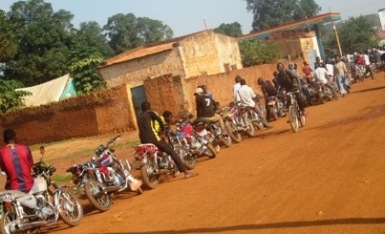South Sudan’s Western Bahr el Ghazal state hit by fuel shortage
May 15, 2015 (WAU) – Western Bahr el Ghazal state, situated in the extreme western part of South Sudan, is hit by fuel shortages as acute scarcity and high exchange rate of US dollars against the local South Sudanese pounds (SSP) continues to deteriorate in the war-torn country.

“We are working hard to help you to bring in fuel and commodities to Wau. The state government is tirelessly working to improve road conditions linking to the state and trying to bridge the issue of hard currency, the US dollar, which remains a major problem facing access of goods from neighbouring countries,” state minister of Trade and Cooperatives, James Ernest Makuei, said on Thursday.
Makuei could not however explain how the skyrocketing dollar exchange rate in the country is directly related bad road conditions in his state, or how long it will take his state government to improve the roads before the rainy season which is only weeks away.
The state official lamented that fuel shortage has forced many businesses to slow down and continue to raise prices higher and higher.
He assured the traders that the state government would reduce taxes so that they maximize profits and encourage them to toil to bring in fuel and other essential commodities into the state.
“The state government will discuss the issue of taxation so that nothing could affect your businesses,” the minister told fuel station managers.
Abdilkarim Mohamed, Star Gass petroleum manager, said they have been since this week as fuel traders discussing the importation process of fuel into Wau, the state capital.
He said high prices of dollar and poor road conditions affected their businesses but promised that a number of fuel tankers have now left Juba for Wau, even though this will not solve shortage of fuel and other commodities in the coming weeks and months when rains make roads impassable.
Prices of diesel since last week has gone up from 10 SSP per a litter to 20 SSP per a litter this week.
Dollar exchange against SSP has gone up to the ratio of 1:10.2 in the market. Both hard currency and local currency reserves have been depleted in the country, forcing the government to print more SSP, which in turn negatively increases the level of inflation.
The local currency (SSP) reserve which was meant to take five years has been depleted in the matter of less than three years. The current fall in global oil price coupled with reduced production of oil in South Sudan has resulted to scarcity of dollar currency in the young nation.
Economists warn that the country’s economy is heading towards collapse, with senior government officials appealing to the regional government to help them fix it.
(ST)
